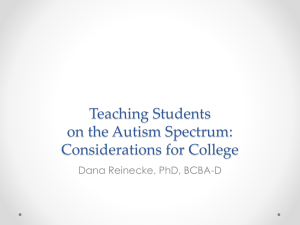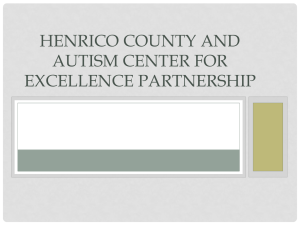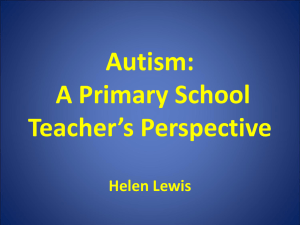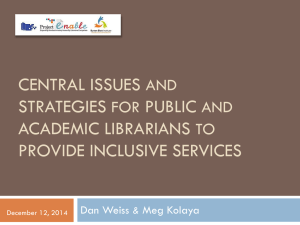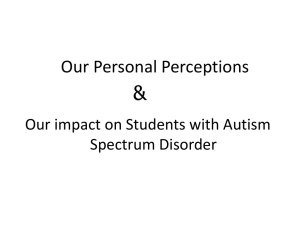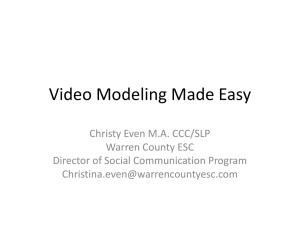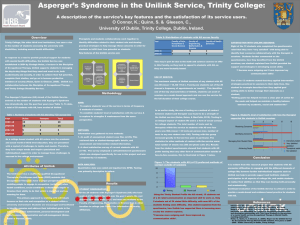Declan Treanor - Conference.ie
advertisement
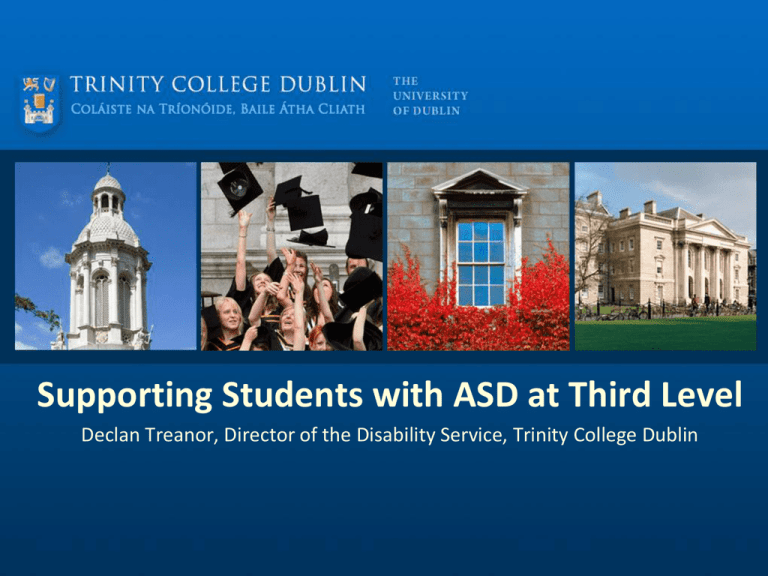
Supporting Students with ASD at Third Level Declan Treanor, Director of the Disability Service, Trinity College Dublin Presentation Aims • Provide the context to this presentation • Discuss ASD and University Life • Explore the model of support for students with ASD at TCD from entering to graduation • Students perspectives on managing college with AS Context-Where are we now? Past Now & Developing • Less supports at secondary school & third level • Less information on ASD • Increase in supports available • Increased recognition and diagnosis • Increased legislation • Access routes to education- DARE Scheme Disability 2008 % 2009 % 2010 % 2011 % 2012 % AS / ASD 36 2.2 76 3.4 68 3.70 94 4.3 129 5.3 ADHD 40 2.5 107 4.8 70 3.80 114 5.2 156 6.5 Blind / VI 24 1.5 54 2.4 36 1.90 36 1.6 1 0.0 Deaf/HoH 67 4.2 110 4.9 70 3.80 77 3.5 70 2.9 Dyspraxia 32 2.0 74 3.3 88 4.7 143 6.6 153 6.3 MHC 49 3.0 115 5.1 89 4.8 129 5.9 226 9.4 Neuro 0 0 43 1.9 39 2.10 36 1.6 36 1.5 Physical 17 1.0 94 4.2 62 3.30 94 4.3 92 3.83 SOI 178 11.1 72 3.2 189 10.2 226 10.4 269 11.2 SLC 0 0 0 0 17 0.90 14 0.6 26 1.08 SpLD 1152 72 1560 69.9 1108 60.3 1197 55.4 1199 50.0 Total 1595 2229 1836 2160 2397 DARE eligibility by disability 2008 – 2012 TCD Registered Students Total Arts, H, & SS Eng, Maths Health (incl TSM) and Systems Sciences Cross Faculty Medical/SOI 144 53 26 48 17 Mental Health 197 81 39 37 40 Physical 98 47 16 18 17 HOH/Deaf 38 25 5 6 2 Visual Impairment 23 13 4 ADHD and ADD 61 21 10 Dyspraxia 52 11 7 Neurological 28 14 3 5 6 Autistic Spectrum Disorder 40 7 24 3 6 Intellectual disability 33 33 Speech Language 2 1 SpLD 370 188 78 89 49 Total 1086 494 212 217 163 6 10 12 8 1 Trinity College Dublin Information 20072012 Maths 2 5% History & Politics 2 5% Course of Study Medicine 1 3% Pharmacy 2 5% Science 13 32% History 2 5% Law 2 5% Engineering 7 18% Arts 9 22% The Transition Secondary -v- Third Level Secondary School Third level education ASD & University Life • Living away from home (Nat. Autistic Soc, UK, 2006); • New university environment is challenging; • Poor organisational skills (Adreon & Durocher, 2007); • Poor self-advocates, decreased leisure engagement & social participation (Gleeson, Nolan & Quinn, 2012); • Leading to ↑ anxiety, stress & depression (Baron-Cohen et al, 1999, Fujikawa, et.al., 1987, Whitehouse, et.al., 2009). Reactive Model Disability Service Counselling Service Tutor Student at the centre Student Union Unilink Health Service Pathway’s Model of Support for Students with disabilities Phase 1 Phase 2 Phase 3 • Phase 1: Pathway to College • Pre-entry, admission and the first year experience • Phase 2: Pathway through College • Building and maintaining a college career • Phase 3: Pathway to employment • Transition to further study or employment Phase 1: Pathway to College Dedicated Transition Website- Pathways workshops • • • • • • • study skills assistive technology transition to college assessment and planning self-determination and self-advocacy examinations managing stress sleep hygiene Supporting students as they make decisions • Individualised meetings with OT’s in supporting transition • Open Evenings-designed for students with ASD and their parents • Working with ASD Support Groupslectures, talks Pathways transition planning tool AS Webpage Orientation days • Orientation/Welcome Day for students with ASD • Day Schedule – Getting to know Trinity-Being a Fresher Student – Campus Tour – Meeting the DS and SU – Being a student learner – Getting to know TCD Computers/Library – Tour of BLU Library – Questions and Answers?? Students Comments about the Day “Everything seems clearer now as a result of the Welcome Day” “I now know what I must do in the coming weeks” “I wanted to look around and learn about Trinity and I did that!” “I came to learn names and find my way around” “Between meeting important staff and being shown around I found I gained the information I wanted.” Phase 2: Pathway through College College Life: Building and maintaining a college career…the bigger picture Phase 2 Supports • Students with ASD can avail of a number of supports in college: – Needs Assessment – Weekly individualised student centred Unilink appointments with OT – Weekly Social Leisure Group – Mock exams – Low Distraction Exam Venues – Meeting with DO-advocate; LENS etc. Weekly Social Leisure Group The Unilink Process 1. Referral. 2. Assessment of student-perceived need (various assessments used on a needs-basis; TSP). 3. Weekly meetings with students (or as required). 4. Contact as needed via phone, text. 5. Reports back to referral sources – all reports co-signed by student. Interventions: what the students with ASD and therapists do in Unilink Some examples of the interventions we use are: –role playing social interactions/situations –developing non-verbal communication skills –making out timetables and setting weekly goals –developing healthy and balanced routines –helping with assignments – outline, structure, planning, research, developing study techniques –planning and organisational skills development –develop strategies to manage mental health diffiuclties Interventions: what the students with ASD and therapists do in Unilink • providing environmental management/adaptations/suggestions • providing hands-on orientation of the college environment • providing relaxation strategies and anxiety management • providing practical help with understanding and using college systems • breaking tasks down – activity analysis, chunking • making suggestions for eating & snacking • advocating for the student Phase 3: Pathway to Employment Overview • Supporting students getting Internships; 2 students with Internships last year • Workshops- developing CV’s, disclosure & interview skills • Development of work readiness skills and managing health & wellbeing in the workplace • Employment booklet developed for use with students Student Outcomes Outcome • . Passed exams 2006- 2007-2008 2008-2009 2009-2010 2010-11 2011-12 2007 3 (60%) 5 (55.6) 10 (66.7%) 12 (52.2%) 22 (75.8%) 32 (82%) Failed year 1 (20%) 4 (44.4%) 0 7 (30.4%) 4 (13.7%) 2 (5.1%) Off-books 1 (20%) 0 1 (6.7%) 1 (4.3%) 1 (3.4%) 2 (5.1%) Withdrew from 0 0 4 (26.7) 3 (13%) 2 (6.8%) 3 (7.6%) 5 (100%) 9 (100%) 15 (100%) 23 (100%) 29 (100%) 39 (100%) incl. graduated Course TOTAL What is the Future in supporting students with ASD at College?? • Unilink now provided in DCU, UCD, DIT & Marino • To continue to provide student needs based serviceslistening to the voices of students & adapting to the need • Encourage more & more students to think about the possibility of college life Student Perspectives on University Any Questions? Thank you for listening! Declan Treanor dtreanor@tcd.ie Claire Gleeson clgleeso@tcd.ie http://www.tcd.ie/disability/services/Unilink/index .php http://www.tcd.ie/disability/AS http://www.tcd.ie/pathways-to-trinity/ References Adreon, D., & Durocher, J. (2007). Evaluating the College Transition Needs of Individuals with High-Functioning Autism Spectrum Disorders. Intervention in School and Clinic. 42, (5). 271-279. Autism Task Force. (2001). Educational Provision and Support for Persons with Autistic Spectrum Disorders: the Report of the Task Force on Autism. Task Force on Autism. American Psychiatric Association. (2000). Diagnostic and Statistical Manual of Mental Disorders, 4th ed. Text Revision. Washington, DC. Baron-Cohen, S., Wheelwright, S., Stone, V., & Rutherford, M. (1999). A Mathematician, a Physicist and a Computer Scientist with Asperger Syndrome: Performance on Folk Psychology and Folk Physics Tests. Neurocase. 5, 475-483. Baxter R, Friel K, McAtamney A, White B, Williamson S (1995) Leisure enhancement through occupational therapy. London: College of Occupational Therapists. Burrows, M., Ford, J., & Bottroff, V. (2001). The Post School Outcomes of Young Adults with Autism Spectrum Disorder. Australasian Journal of Special Education. 25,(1&2),34-48. Devas, M. (2003). Support and access in sports and leisure provision. Disability & Society. 18, (2). 231-245. Doyle, A., Treanor, D. & Reilly, D. (2012).Pathway Outreach, Transition, Retention and Progression Plan 2011-2014. Fujikawa, H., Kobayashi, R., Koga, Y., & Murata, T. (1987). A Case of Asperger’s Syndrome in a nineteen-year-old who showed psychotic breakdown with depressive state and attempted suicide after university. Japanese Society for Child and Adolescent Psychiatry. 28, (4). 217-225. Felsinger, A. & Byford, K. (2010) ‘Managing reasonable adjustments in higher education.’ London: Equality Challenge Unit. Retrieved from http://www.adcet.edu.au/StoredFile.aspx?id=2528&fn=managing-reasonableadjustments-in-higher-educ.pdf French, S.(2004). Can you see the rainbow? The roots of Denial, in Swain, J. French, S., Barnes, C. & Thomas, C. (Eds.). Disabling Barriers – Enabling Environments. Pp. 17-25 London: Sage. Gleeson, C.I., Nolan, C., & Quinn, S. (2012). Exploring and Enhancing Leisure Occupations for University Student with AS. ACAMH Poster. Limerick. Graetz, J., & Spampinato, K. (2008). Asperger’s Syndrome and the Voyage Through High School: Not the Final Frontier. Journal of College Admission. 19-24. www.nacacnet.org. Kielhofner, G. (2006). Research in Occupational Therapy. Methods of Inquiry for Enhancing Practice. Philadelphia: F.A.Davis. King, G. , Petrenchik, T., Law, m., and Hurley, P. (2009). The enjoyment of formal and informal recreation and leisure activities: A comparison of school aged children with and without physical disabilities. International Journal of Disability, Development and Education. 56, (2), 109-130. National Autistic Society, United Kingdom. (2006). University: how to support students with Asperger’s Syndrome. www.nas.org.uk/jsp. Retrieved 17 April 2009. Tantum, D. (2000). Psychological Disorder in Adolescents and Adults with Asperger Syndrome. Autism. 4(1), 47-62. Passmore, A. (2003). The occupation of leisure: three typologies and their influence on mental health in adolescence. OTJR: Occupation, Participation and Health. 23, 76. Quinn, S., Gleeson, C., & Nolan, C. (2009). Managing Asperger’s Syndrome in third level education – A service evaluation. Annual conference of Association of Occupational Therapists of Ireland, Kilkenny. Dublin: AOTI. Thompson, D., & Emira, M. (2011). ‘They say every child matters, but they don’t’: an investigation into parental and carer perceptions of access to leisure facilities and respite care for children and young people with Autistic Spectrum Disorder (ASD) or Attention Deficit Hyperactivity Disorder (ADHD). Disability & Society. 26(1), 65-78. Whitehouse, A.J., Durkin, K., Jaquet, E., & Ziatus, K. (2009). Friendship, Loneliness and Depression in Adolescents with Asperger’s Syndrome. Journal of Adolescence. 32, (2). 309-322.



